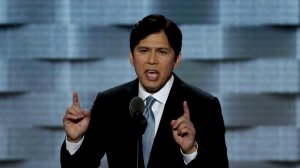When the Trump administration declared war on California with a lawsuit challenging sanctuary state policies this week, it played right into the hands of Kevin de León — and virtually every other Golden State Democrat running for higher office.
There is nothing that de León, the state Senate leader who is challenging Sen. Dianne Feinstein, relishes more than a fight with President Donald Trump — in this case, on a law that he authored making California a “sanctuary state.”

“They are angry and they’re upset, because we won’t participate with them tearing apart honest, hard-working families,” de León said Wednesday in a telephone interview. He argued that Senate Bill 54, one of the laws being challenged, did not in any way prevent federal immigration agents from doing their job, but does prevent them from entering sensitive spaces like hospitals, churches, courthouses and public schools.
“If they have a judicial warrant they may move forward,” de León said. “But we don’t want them raiding schools and churches. We don’t want them going to emergency room centers, which they did in the state of Texas, where they pulled out a woman who was there for chemotherapy. That just demonstrates the cruelness and inhumanity of an administration that one would expect from a rogue nation, not the greatest nation.”
With the administration now suing California over parts of three “sanctuary” laws that are intended to protect undocumented immigrants from federal immigration officials, de León noted that he’d directed former US Attorney Eric Holder — who helped craft the initial bill — to draft an amicus brief in response to the lawsuit arguing that the state is on solid constitutional ground.
“This has less to do with law, and more to do with politics — weaponizing immigration policy,” he said. “This is more about intimidating the state of California into conforming our values to President Trump’s inhumane and xenophobic immigration policies.”
Joining de León in his outrage was the full slate of Democrat gubernatorial candidates — including Lieutenant Governor Gavin Newsom, former Los Angeles mayor Antonio Villaraigosa and State Treasurer John Chiang — as well as potential 2020 presidential contenders like Eric Garcetti and Kamala Harris.
Garcetti tweeted that while the federal government “wastes time and resources on threats, we will continue to focus on keeping our people safe.”
“Imagine,” the LA Mayor tweeted, “if Trump’s Justice Department were to put this much energy into actually solving problems.”
In this election season of discontent with Trump, all of California’s Democratic candidates have attempted to position themselves as the strongest adversary to the President, whose approval rating has fallen below 30% in the state, according to a recent Gallup survey.
The Department of Justice lawsuit offered a new hook — providing rich anti-Trump material to mine on the campaign trail before California’s top-two primary in June.
Sessions announced the Justice Department lawsuit on Wednesday during an appearance at a state law enforcement gathering in Sacramento. But even before that, Harris, a former prosecutor, had positioned herself as the interrogator-in-chief, drilling Trump’s nominees on their policy on immigration and the so-called Dreamers in a series of Senate hearings.
Garcetti has encouraged fellow Democrats to take a cooler approach to Trump — by simply dismissing his more outrageous statements as nonsense unworthy of discussion.
In the governor’s race, Newsom has styled himself as the candidate with the courage to stand up to Trump and demand change. On Wednesday, he hosted a “Facebook Live” from his office in Sacramento with several immigrants who felt shielded by the state’s immigration policies.
Newsom invoked the racist, nativist rhetoric around Proposition 187, the 1994 ballot measure that would have barred immigrants from getting basic state services. (The measure passed overwhelmingly, but was ultimately struck down by the courts).
“California is remarkably resilient; it’s a point of pride and it’s also a point to punctuate,” Newsom said in his Facebook Live Wednesday afternoon. “We’ll get through this moment despite that same kind of xenophobia, that same kind of nativism, that same kind of fear-mongering that we saw front-and-center today here in our state’s capitol from Jeff Sessions.”
Villaraigosa called the Department of Justice lawsuit “a publicity stunt” that amounted to Sessions “trying to keep his job.”
“Nobody is saying that they can stop ICE agents from deporting people who are here illegally,” said Villaraigosa. “But we are saying we don’t have to cooperate with them. The state’s principal function is protecting public safety, not enforcing their immigration laws. That’s their responsibility.”
Chiang has often noted the racism and bigotry that his parents faced as immigrants, declaring that “California needs to stand up to a bully named Donald Trump.”
“We’re fighting for what American laws stand for,” Chiang said. “We had laws that discriminated against African-Americans; that discriminated against Asians; that treated women as second-class citizens. This is the battle of the 21st century today.”
Pointing to some of the state’s vanguard legal battles, Chiang argued that Californians “are the visionaries; we’re the fighters. And we’re employing an argument that Republicans and conservatives will understand. We’re fighting for states’ rights. We get to decide who we are and what we believe in.”












